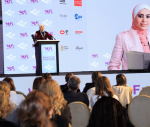You are here
Silenced voices: Surge in censorship targets Pro-Palestine content on social media
By Mays Ibrahim Mustafa - Nov 05,2023 - Last updated at Nov 04,2023
AMMAN — Digital watchdog groups have been documenting the censorship of content supporting Palestine since October 7, amidst a rise in hate speech and incitement against Palestinians on various social media platforms.
7amleh (The Arab Centre for the Advancement of Social Media) said in a statement issued on Friday that digital violations against Palestinians, primarily carried out by social media companies, have “persisted” throughout October.
The digital rights group has documented a total of 1,001 violations last month, including censorship (412), disseminating violent and harmful content (582), and restrictions or bans on the use of digital economy platforms (7).
It stated that “punitive” censorship measures imposed on pro-Palestinian content included account restrictions (159), removing content (121), account suspensions (94), and reducing reach (28), among others.
Using its AI-powered monitoring tool (Violence Indicator), 7amleh detected over half a million instances of violent and hateful content targeting the Palestinian people in the Hebrew language throughout October, across various social media platforms, mainly X (formerly Twitter).
There were approximately 14 million interactions with this content, including likes, comments and others, according to 7amleh.
“This illustrates the extent of the proliferation and reach of such negative content, leading to consequential fatal real-world impacts on the Palestinian populations,” it noted.
‘Outrageous’ bias to genocide
The Palestinian NGO Sada Social said in its most recent update that it has so far recorded over 20,000 instances of inciting content against Palestinians, including photos, videos and written phrases.
It stressed that the digital space is witnessing an “outrageous” bias to the war of “genocide” on Palestinians.
A campaign titled “Bollywood Actors” was organised to discredit the crimes committed by Israel against people in Gaza, according to Sada Social.
It explained that this campaign included circulating images of civilian victims in Gaza with captions describing them as “Bollywood actors” and claiming that the crimes committed against them are “fictional” and fake.
The watch group added that photos of victims in Gaza were also used as material to make comedic and satirical content. For example, one video included scenes of body parts under the rubble in one of the “massacres” committed by Israel in Gaza with the caption “who wants a roasted shoulder?”
Sada Social contacted social media platforms to remove these videos, and their request was approved but the accounts that posted these videos remain active.
It also recorded over 160 false and misleading information, “the spread of which contributed to creating a cover for the Israeli aggression on Gaza and an attempt to justify the killing of civilians”.
The rights group added that it has recently received “dangerous complaints” against privacy violations on WhatsApp and Facebook Messenger, blocking users from sending certain messages, although conversations on these two applications are “end-to-end encrypted” according to Meta.
Over 170 phone numbers have been blocked from using WhatsApp during October, over 90 of who are owned by reporters in the Gaza Strip. Additionally, more than 270 threat messages through chat applications and SMS were sent to Palestinians mostly (95 per cent) in the West Bank, according to Sada Social.
It also documented over 11,000 “digital violations” against Palestinian content on social media platforms, targeting press and media organisations in 45 per cent of cases.
Previous research documents ‘human rights’ violations by Meta
This is not the first time Meta is accused of being biased against Palestinians.
Following the Israeli war on Gaza in May 2021, Human Rights Watch (HRW) said in a statement that both Facebook and Instagram, platforms owned by Meta, have “wrongfully” removed and suppressed pro-Palestinian content.
The “Human Rights Due Diligence of Meta’s Impacts in Israel and Palestine in May 2021” report published by Business for Social Responsibility (BSR) in September 2022 supported this accusation.
It concluded that “Meta’s actions in May 2021 appear to have had an adverse human rights impact… on the rights of Palestinian users to freedom of expression, freedom of assembly, political participation, and non-discrimination, and therefore on the ability of Palestinians to share information and insights about their experiences as they occurred”.
The report’s findings also “identified both over-enforcement [erroneously removed content and erroneous account penalties] and under-enforcement [failure to remove violating content and failure to apply penalties to offending accounts] of Meta content policies during May 2021”.
Last week, HRW said in an instagram post that it is documenting censorship and suppression of content related to Israel and Palestine on social media since October 7.
It urged users who have experienced censorship to share the information through [email protected], promising “anonymity” in its reporting.
Related Articles
AMMAN — 7amleh (The Arab Centre for the Advancement of Social Media) has documented over 103,000 instances of hate speech and incitement aga
AMMAN — The Palestinian NGO Sada Social has detected over 3,000 digital violations against Palestinian content on social media platforms dur
AMMAN — There has been over 4,800 restrictive measures enforced by social media platforms against Palestinian content since October 7, accor



















